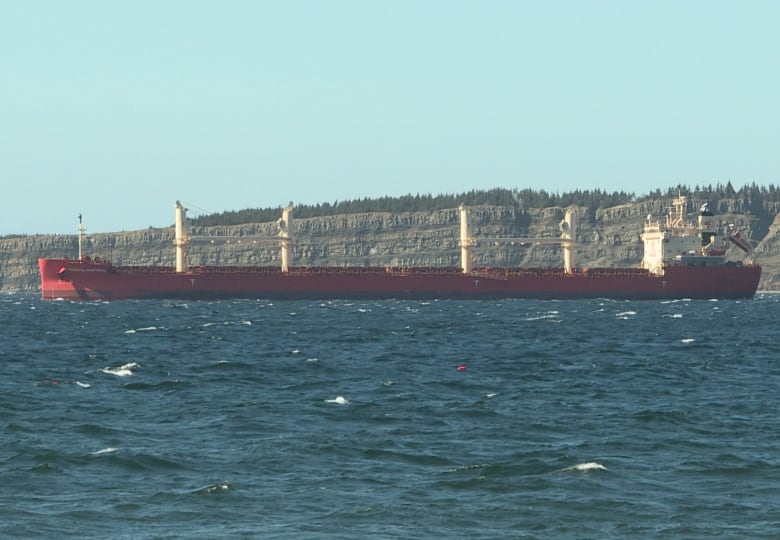Ages 12 and up to get first COVID shot before school year ends, Fitzgerald says, as N.L. reports 5 new cases
N.L. nurse on Ontario's front lines calls outbreak 'a natural disaster'

A change in national vaccine guidelines means Newfoundland and Labrador is tweaking its vaccination rollout, and is now promising to get first shots to children age 12 and up before the end of the school year.
Health Canada revised its rules for the Pfizer-BioNTech vaccine Wednesday to allow its use in people between the ages of 12 and 15. The previous cutoff for that vaccine was 16 years old
"This is a really important group to get vaccinated," said Dr. Janice Fitzgerald, the province's chief medical officer of health, during Wednesday afternoon's briefing.
"And as we saw with our last outbreak … kids in this age group can certainly spread this virus."
February's outbreak in Newfoundland and Labrador centred around high school students in the Mount Pearl area and was fuelled by sporting events and social gatherings. The outbreak saw caseloads spike due to a highly contagious variant of the coronavirus, leading to a province-wide lockdown and derailing the provincial election.
"Children and youth comprise a significant proportion of the population and tend to have more interactions with others through school, social networks and activities," said Fitzgerald.
According to Heath Minister John Haggie, the Pfizer-BioNTech change means about 30,000 more Newfoundlanders and Labradorians are now eligible to be vaccinated. That's equal to about one week's Pfizer deliveries to the province, he said.

Incorporating the younger demographic into the province's current rollout is "very much in the early planning stages," according to Fitzgerald. She said the goal is to get all 12- through 15-year-olds fully vaccinated by early in the next school year, and may involve holding clinics within schools.
"It's still in the planning process. So once we are firm on how we're going to do that, then we'll be certainly letting people know," she said.
Thursday's update
Meanwhile, Newfoundland and Labrador reported five new cases of COVID-19 on Thursday, and one more in a crew member aboard the Federal Montreal cargo ship anchored in Conception Bay.
Fourteen of the ship's crew members are COVID-19 positive. The ship and crew are following public health orders, the crew remains aboard, and there is no risk of community spread, according to a Department of Health media release.
On land, two of Thursday's new cases are in the Eastern Health region. One is a man between 20 and 39 years old and related to travel within Canada. The second case is a man under 20 years old who is a contact of a previous case.
The remaining three cases are spread out across the province: one in each of the Central, Western and Labrador-Grenfell Health regions. In Central Health it's a woman in her 40s and related to travel within Canada. In Western Health it's a man between 20 and 39 years old and the case is still under investigation by public health. The case in Labrador-Grenfell is a man between 20 and 39 years old and related to international travel.

The province also reported six new recoveries, leaving 58 active cases. One person is in hospital, a crew member of the Federal Montreal cargo ship.
To date, 135,201 people have been tested, including 464 since Wednesday's update.
A case reported April 23 in the Western Health region remains under investigation.
'A wildfire' on COVID-19's frontlines
As the third wave of COVID-19 devastates some provinces, a trend is emerging that virus variants are causing younger people to become sicker than any point prior in the pandemic.
Jennifer Hinks, a nurse practitioner from St. John's now working in Toronto as part of a medical relief team, is seeing that first hand on her unit, which she calls "the last line of defence in Ontario with regards to COVID-19."
"It's people who live in multi-generational households, are young, that are becoming very ill, and they require a lot of intensive, one-on-one nursing care," she said.
In preparing to head into one of Canada's biggest COVID-19 hotspots, Hinks said she had the training and skills to help patients, families, and other health-care workers. But one thing hard to anticipate, she said, was the sheer volume of sick people.
"This is a wildfire. This is a natural disaster," she told CBC Radio's Labrador Morning.
"It's happening in our own country, and I think that as much as we were prepared for that, it certainly didn't become reality until we got here."

Hinks and six other people from Newfoundland and Labrador's first Ontario relief team have made a big impact in their time so far in Toronto's COVID-19 units, she said, where staff have been exhausted by the grind of the pandemic's unrelenting circumstances.
"It's been heart-wrenching to hear the nurses' stories, and I think that it certainly will be personally and professionally a life-changing experience," she said.
As of Wednesday, Newfoundland and Labrador had 58 active cases. The vast majority are related to travel, and there have been no signs of community spread. Armed with her Ontario experience, Hinks urged people to get vaccinated and follow public health rules to stave off another outbreak.
"I just want everyone to stay vigilant," she said.
With files from Labrador Morning
